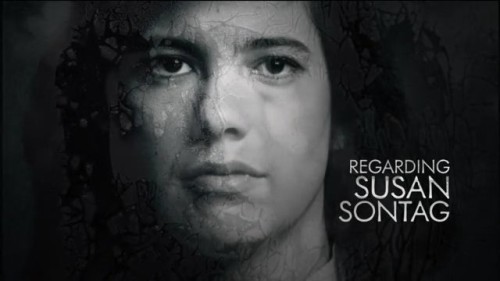
Written by Rachael Johnson.
Susan Sontag (1933-2004) was a writer, political activist and filmmaker as well as an immensely influential critic. She wrote and spoke about almost everything. Her interests included high and popular culture, photography, politics, and illness. Her essays “Against Interpretation” (1966) and “Notes on Camp” (1964), are rightly recognized as pioneering works of cultural criticism. Although Sontag was a better cultural critic than novelist, her works of fiction demonstrated a certain creative ambition. She was also politically active. In the 60s, she campaigned against the Vietnam War and in the 90s, she directed Waiting for Godot during the Siege of Sarajevo. Sontag challenged and provoked. Her piece in the New Yorker characterizing 9/11 as “an attack on the world’s self-proclaimed superpower” was hugely controversial.

Directed by Nancy Kates, the HBO documentary Regarding Susan Sontag (2014) chronicles the intellectual icon’s private and public life. Sontag came of age in conservative post-war America but did not conform to its rigid sexual and gender norms. She was told by her step-father that too much reading meant no husband. She ignored him, of course, and went on to study at Berkeley and the University of Chicago. Strangely enough, she married the sociologist Philip Rieff at 17, and had a child at 19. Although the marriage lasted eight years, her life soon took another turn when she left the States to study in Paris. Sontag was bisexual, and had affairs with men and women throughout her life, although she did not come out in her younger years. The documentary also covers her activism–her trips to North Vietnam and Sarajevo as well as involvement with PEN American center.
Featuring commentary by former lovers, friends and family, Regarding Susan Sontag offers a very personal portrait of its subject. Acknowledging both her strengths and flaws, the documentary cannot be accused of hagiography. Armed with arresting looks and a penetrating intelligence, Sontag was a glamorous cultural icon. She was, however, sometimes knocked as self-absorbed and self-important. Some interviewees testify that she was not always an easy person to be around. A friend and former lover confides, “She was never able to know what goes on inside another person.” Still, Sontag loved life, and the accounts of the suffering she endured during her illness–she had two bouts of cancer–move the viewer.

The documentary does not, however, engage with Sontag’s ideas sufficiently, and more time could also have been spent on her politics. The first part of the film, in particular, focuses too much on her private life. This is, of course, quite typical of British and American profiles of cultural and political figures. You also don’t get the sense of just how provocative Sontag often was for an American public intellectual. At the beginning of the documentary, we see a clip of the writer on television defending the essay she wrote after 9/11, but we don’t return to the debate. Sontag also delivered another polemic when she stated that “the white race is the cancer of human history.” Kates touches on this but there is no discussion about the piece.
The documentary also does not examine her film on the Israel-Palestine conflict, Promised Lands (1974). Time constraints factor in here as well, of course. The documentary simply needs to be bigger, and longer. Nevertheless, we should be thankful for Regarding Susan Sontag. God knows there aren’t that many documentaries about public intellectuals out there–male or female. It’s certainly not dull. Sontag led a colorful, ground-breaking life, and her contemporaries offer interesting observations regarding the private woman. While not being a particularly erudite contribution to our understanding of the intellectual icon, Kates acknowledges her subject’s individualistic spirit.
